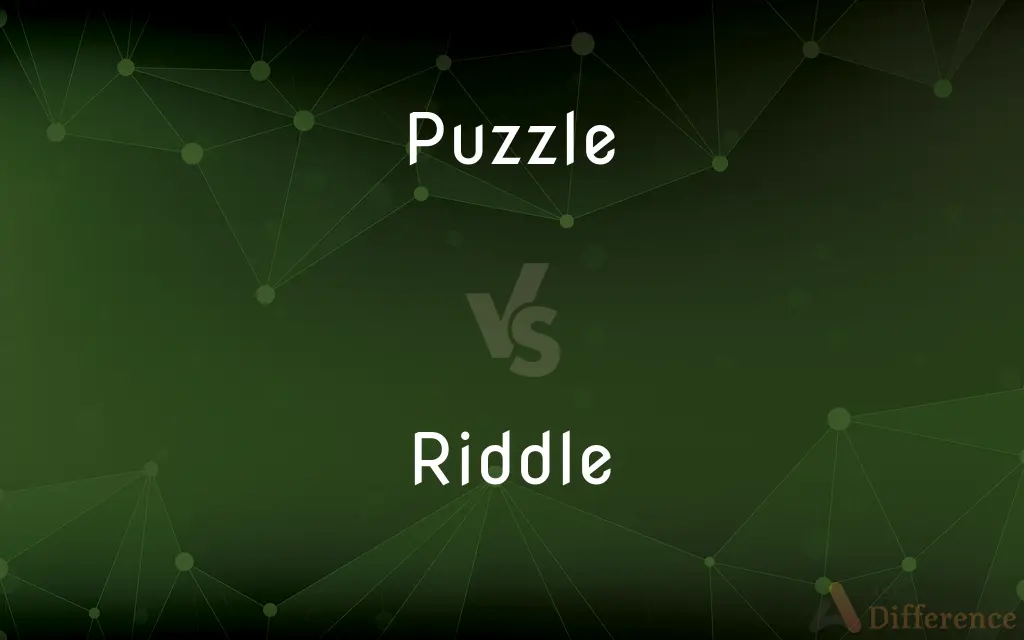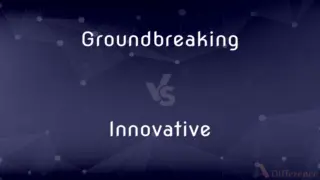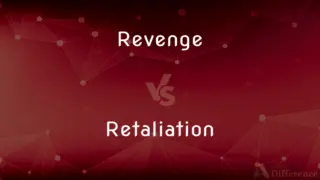Puzzle vs. Riddle — What's the Difference?
By Tayyaba Rehman — Updated on September 14, 2023
A puzzle is a problem requiring a solution, often involving pieces or clues, while a riddle is a question or statement requiring thought to answer or explain.

Difference Between Puzzle and Riddle
Table of Contents
ADVERTISEMENT
Key Differences
Puzzles come in various forms and often require manipulation of physical items or mental engagement to find a solution. Riddles, on the other hand, are primarily linguistic and revolve around clever wordplay or hidden meanings. A puzzle could be a jigsaw, where one arranges pieces to complete an image. In contrast, a riddle might be a cryptic statement or question, aiming to challenge one's understanding and interpretation.
Puzzles might require spatial reasoning, pattern recognition, or logical deduction. Riddles focus more on the play of words, employing ambiguity, metaphor, or allegory. When solving a puzzle, one might arrange blocks, connect dots, or decipher codes. Conversely, when contemplating a riddle, one seeks the underlying meaning or hidden answer behind the words.
Both puzzles and riddles stimulate the brain, but they engage different cognitive processes. While a puzzle could challenge one's analytical skills, pushing them to arrange, match, or connect, a riddle nudges the thinker to dive deep into language, seeking layers beneath the apparent.
Puzzles can be found in daily activities like crosswords, sudoku, or escape rooms. Riddles, meanwhile, often appear in literature, folklore, or casual brain-teasing among friends. Both are essential tools for educators, trainers, and entertainers, utilizing the joy of challenge and the satisfaction of a solution.
Comparison Chart
Nature
Often physical or logical challenges.
Linguistic, using wordplay or hidden meanings.
ADVERTISEMENT
Primary Skill
Spatial reasoning or pattern recognition.
Linguistic analysis and interpretation.
Examples
Jigsaw, crossword, sudoku.
"What has keys but can't open locks? A piano."
Usage
Games, brain-training apps, educational tools.
Folklore, literature, casual teasing.
Cognitive Engagement
Analytical, manipulative, deductive.
Interpretive, reflective, allegorical.
Compare with Definitions
Puzzle
Puzzles are often designed for entertainment.
The newspaper's puzzle section is popular.
Riddle
It's a statement or question having a double or veiled meaning.
The sphinx posed a riddle to Oedipus.
Puzzle
They can involve symbols or patterns.
The cryptogram was a challenging puzzle.
Riddle
A riddle is a statement, question or phrase having a double or veiled meaning, put forth as a puzzle to be solved. Riddles are of two types: enigmas, which are problems generally expressed in metaphorical or allegorical language that require ingenuity and careful thinking for their solution, and conundra, which are questions relying for their effects on punning in either the question or the answer.
Puzzle
It's a perplexing situation or problem.
The mystery was a puzzle to the detectives.
Riddle
To pierce with numerous holes; perforate
Riddle a target with bullets.
Puzzle
A puzzle is a game, problem, or toy that tests a person's ingenuity or knowledge. In a puzzle, the solver is expected to put pieces together in a logical way, in order to arrive at the correct or fun solution of the puzzle.
Riddle
To spread throughout
"Election campaigns have always been riddled with demagogy and worse" (New Republic).
Puzzle
Something, such as a game, toy, or problem, that requires ingenuity and often persistence in solving or assembling.
Riddle
To put (gravel, for example) through a coarse sieve.
Puzzle
Something that baffles or confuses; an enigma
The puzzle of the author's true identity.
Riddle
To solve or explain.
Puzzle
The condition of being perplexed; bewilderment
I'm really in a puzzle over how this happened.
Riddle
To propound or solve riddles.
Puzzle
To baffle or confuse mentally by presenting or being a difficult problem or matter.
Riddle
To speak in riddles.
Puzzle
To clarify or solve (something confusing) by reasoning or study
He puzzled out the significance of the statement.
Riddle
A coarse sieve, as for gravel.
Puzzle
To be perplexed.
Riddle
A question or statement requiring thought to answer or understand; a conundrum.
Puzzle
To ponder over a problem in an effort to solve or understand it.
Riddle
One that is perplexing; an enigma.
Puzzle
Anything that is difficult to understand or make sense of.
Where he went after he left the house is a puzzle.
Riddle
A verbal puzzle, mystery, or other problem of an intellectual nature.
Here's a riddle: It's black, and white, and red all over. What is it?
Puzzle
A game for one or more people that is more or less difficult to work out or complete.
Riddle
An ancient verbal, poetic, or literary form, in which, rather than a rhyme scheme, there are parallel opposing expressions with a hidden meaning.
Puzzle
A crossword puzzle.
Riddle
A sieve with coarse meshes, usually of wire, for separating coarser materials from finer, as chaff from grain, cinders from ashes, or gravel from sand.
Puzzle
A jigsaw puzzle.
Riddle
A board with a row of pins, set zigzag, between which wire is drawn to straighten it.
Puzzle
A riddle.
Riddle
(obsolete) A curtain; bedcurtain.
Puzzle
(archaic) Something made with marvellous skill; something of ingenious construction.
Riddle
(religious) One of the pair of curtains enclosing an altar on the north and south.
Puzzle
The state of being puzzled; perplexity.
To be in a puzzle
Riddle
To speak ambiguously or enigmatically.
Puzzle
(transitive) To perplex, confuse, or mystify; to cause (someone) to be faced with a mystery, without answers or an explanation.
Riddle
(transitive) To solve, answer, or explicate a riddle or question.
Riddle me this.
Puzzle
(intransitive) To think long and carefully, in bewilderment.
We puzzled over the curious-shaped lock, but were unable to discover how the key should be inserted.
Riddle
To put something through a riddle or sieve; to sieve; to sift.
You have to riddle the gravel before you lay it on the road.
Puzzle
(transitive) To make intricate; to entangle.
Riddle
To fill with holes like a riddle.
The shots from his gun began to riddle the targets.
Puzzle
Something which perplexes or embarrasses; especially, a toy or a problem contrived for testing ingenuity; also, something exhibiting marvelous skill in making.
Riddle
To fill or spread throughout; to pervade.
Your argument is riddled with errors.
Puzzle
The state of being puzzled; perplexity; as, to be in a puzzle.
Riddle
To plait.
Puzzle
To perplex; to confuse; to embarrass; to put to a stand; to nonplus.
A very shrewd disputant in those points is dexterous in puzzling others.
He is perpetually puzzled and perplexed amidst his own blunders.
Riddle
A sieve with coarse meshes, usually of wire, for separating coarser materials from finer, as chaff from grain, cinders from ashes, or gravel from sand.
Puzzle
To make intricate; to entangle.
They disentangle from the puzzled skein.
The ways of Heaven are dark and intricate,Puzzled in mazes, and perplexed with error.
Riddle
A board having a row of pins, set zigzag, between which wire is drawn to straighten it.
Puzzle
To solve by ingenuity, as a puzzle; - followed by out; as, to puzzle out a mystery.
Riddle
Something proposed to be solved by guessing or conjecture; a puzzling question; an ambiguous proposition; an enigma; hence, anything ambiguous or puzzling.
To wring from me, and tell to them, my secret,That solved the riddle which I had proposed.
'T was a strange riddle of a lady.
Puzzle
To be bewildered, or perplexed.
A puzzling fool, that heeds nothing.
Riddle
To separate, as grain from the chaff, with a riddle; to pass through a riddle; as, riddle wheat; to riddle coal or gravel.
Puzzle
To work, as at a puzzle; as, to puzzle over a problem.
Riddle
To perforate so as to make like a riddle; to make many holes in; as, a house riddled with shot.
Puzzle
A particularly baffling problem that is said to have a correct solution;
He loved to solve chessmate puzzles
That's a real puzzler
Riddle
To explain; to solve; to unriddle.
Riddle me this, and guess him if you can.
Puzzle
A toy that tests your ingenuity
Riddle
To speak ambiguously or enigmatically.
Puzzle
Be a mystery or bewildering to;
This beats me!
Got me--I don't know the answer!
A vexing problem
This question really stuck me
Riddle
A difficult problem
Puzzle
Be uncertain about; think about without fully understanding or being able to decide;
We puzzled over her sudden departure
Riddle
A coarse sieve (as for gravel)
Puzzle
A puzzle is a game or problem to test ingenuity.
The jigsaw puzzle took hours to complete.
Riddle
Pierce many times;
The bullets riddled his body
Puzzle
Puzzles often have a clear solution or answer.
The puzzle's solution was on the box's bottom.
Riddle
Set a difficult problem or riddle;
Riddle me a riddle
Riddle
Separate with a riddle, as grain from chaff
Riddle
Speak in riddles
Riddle
Explain a riddle
Riddle
A riddle is a puzzling question posed as a problem to be solved.
Riddles often have clever or unexpected answers.
Riddle
Riddles challenge one's interpretation of words.
The riddle left everyone guessing.
Riddle
They are often used for amusement.
Children love to share riddles during playtime.
Riddle
Riddles rely on metaphor, allegory, or ambiguity.
The riddle was a play on words.
Common Curiosities
Can a riddle be a puzzle?
Yes, a riddle is a type of puzzle focused on linguistic challenge.
What makes riddles unique?
Riddles primarily use wordplay, hidden meanings, or clever phrasing to challenge the thinker.
How can puzzles aid in learning?
Puzzles can enhance critical thinking, pattern recognition, and problem-solving skills.
Are riddles limited to questions?
No, riddles can be statements or questions, but they always require interpretation.
Are puzzles always physical?
No, puzzles can be physical, like jigsaws, or mental, like logical problems.
Are puzzles beneficial for the brain?
Yes, puzzles can boost cognitive function, improve memory, and enhance problem-solving skills.
Can riddles be poetic?
Absolutely, many riddles use poetic devices, and some are structured as poems.
Why are riddles popular in folklore?
Riddles are compact, intriguing, and can convey wisdom or moral lessons, making them apt for folklore.
What is a puzzle's primary purpose?
A puzzle is designed to challenge and test one's problem-solving skills.
How old is the tradition of riddling?
Riddling is ancient, found in many cultures' folklore, literature, and traditions.
How do puzzles relate to math and science?
Many puzzles are based on mathematical or scientific principles, aiding in learning these concepts.
Can puzzles be collaborative?
Yes, some puzzles, like escape rooms, are designed for group problem-solving.
What's the difference between a riddle and a joke?
While both can be humorous, a riddle requires interpretation or insight to find an answer, while a joke aims to amuse.
Are riddles culturally specific?
Some riddles are, as they can be based on cultural references, but many have universal themes.
Do puzzles always have a single solution?
While most puzzles have a designated solution, some can have multiple approaches or answers.
Share Your Discovery

Previous Comparison
Groundbreaking vs. Innovative
Next Comparison
Revenge vs. RetaliationAuthor Spotlight
Written by
Tayyaba RehmanTayyaba Rehman is a distinguished writer, currently serving as a primary contributor to askdifference.com. As a researcher in semantics and etymology, Tayyaba's passion for the complexity of languages and their distinctions has found a perfect home on the platform. Tayyaba delves into the intricacies of language, distinguishing between commonly confused words and phrases, thereby providing clarity for readers worldwide.















































